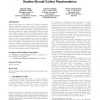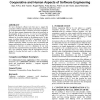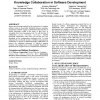ICSE
2008
IEEE-ACM
16 years 2 months ago
2008
IEEE-ACM
Substantial effort in the development of any large system is invested in testing. Studies of testing tend to be either technical or concerned with the cognitive ability of testers...
98
Voted
ICSE
2008
IEEE-ACM
16 years 2 months ago
2008
IEEE-ACM
The visualizations of the Whyline are presented, which focus on supporting the exploration a source code and how it executes. The visualization is concise, simple to navigate, and...
147
click to vote
ICSE
2008
IEEE-ACM
16 years 2 months ago
2008
IEEE-ACM
Models become increasingly important for software development processes. Though there is a multitude of software modeling tools available, the handling of diagrams is still diffic...
94
Voted
ICSE
2008
IEEE-ACM
16 years 2 months ago
2008
IEEE-ACM
Maintaining a developer's awareness of changes in the software on which she depends is challenging. Awareness is often impeded at two ends of the spectrum: a lack of informat...
105
Voted
ICSE
2008
IEEE-ACM
16 years 2 months ago
2008
IEEE-ACM
In this paper we present a new variation of cultural probes, called Infrastructure Probes (IP). IPs can be seen as an additional ethnographic method to get a deeper understanding ...
125
click to vote
ICSE
2008
IEEE-ACM
16 years 2 months ago
2008
IEEE-ACM
Even though software is developed by humans, research in software engineering primarily focuses on the technologies, methods and processes they use while disregarding the importan...
123
click to vote
ICSE
2008
IEEE-ACM
16 years 2 months ago
2008
IEEE-ACM
Conducting controlled experiments about programming activities often requires the use of multiple tasks of similar difficulty. In previously reported work about a controlled exper...
122
Voted
ICSE
2008
IEEE-ACM
16 years 2 months ago
2008
IEEE-ACM
We have developed software tools that aim to support the cooperative software engineering tasks and promote an awareness of social dependencies that is essential to successful coo...
107
click to vote
ICSE
2008
IEEE-ACM
16 years 2 months ago
2008
IEEE-ACM
Because the knowledge required for the construction of a complex software system is often widely distributed among its members, programmers routinely engage in collaboration with ...
103
click to vote
ICSE
2008
IEEE-ACM
16 years 2 months ago
2008
IEEE-ACM
The earlier in the software process a fault is detected, the cheaper the cost of fixing the fault. Automated fault detection tools can provide developers with information througho...






